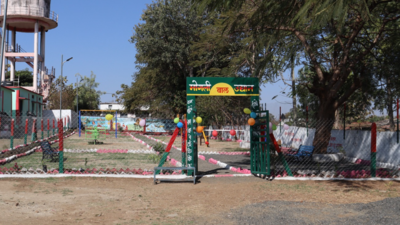- News
- City News
- bhopal News
- From forest to playgrounds: Madhya Pradesh's Pench Tiger Reserve gets 26 Mowgli parks for children
Trending
From forest to playgrounds: Madhya Pradesh's Pench Tiger Reserve gets 26 Mowgli parks for children
Responding to safety concerns after a child's attack, Pench Tiger Reserve initiated Mowgli Bal Udyans, creating 26 community-led play parks in forest buffer villages. These parks, fostering child welfare and conservation, now include reading rooms and libraries. The initiative has garnered strong community support, promoting education, environmental responsibility, and improved relations between villagers and the forest.
BHOPAL: What began as a response to a safety concern in a remote village has now grown into a widely praised model of community-led conservation and child welfare. Under the Pench Tiger Reserve’s innovative project, 26 Mowgli Bal Udyans—special play parks for children—have been set up across forest buffer villages in Madhya Pradesh. These parks, named after the famous Jungle Book character Mowgli, are now being expanded to include reading rooms and libraries, giving children safe places not only to play, but also to learn and grow.
The initiative has received such strong community support that local political leaders are now asking to be invited as chief guests for park inaugurations—showing the project’s growing social impact and recognition.
The idea took shape in Savangi village in April 2024, after a young girl was attacked by stray dogs while playing near the forest. In response, Pench management, along with Eco Development Committees (EDCs), proposed creating a safe play area within the village. The proposal was quickly accepted, and the first Mowgli Bal Udyan opened on 22 April 2024.
Since then, the project has expanded into the Rukhad, Karmajhiri and Turia ranges, with 26 parks built in just one year. These parks are the result of joint forest management: local communities choose the land, layout, and facilities, while the forest department provides technical and financial support.
Each park includes educational signs to teach children about forest life, wildlife, and the importance of protecting nature. The parks have also become community spaces where villagers—especially women and elders—can gather, relax, and socialise.
To support learning, Mowgli Reading Rooms have been opened in Belgaon and Chitapar, stocked with children’s books and learning materials. These libraries are looked after by the children themselves, helping to build a love for reading in villages with few educational resources.
To keep these parks clean and active, children’s groups called Friends of Mowgli have been formed in each village. These groups take care of plants, maintain the parks, and lead celebrations on days like Environment Day and Wildlife Week. This encourages responsibility, leadership, and care for the environment.
The initiative is also helping the forest in other ways. Villages have become cleaner, tree planting activities have increased, and cooperation with forest staff on wildlife safety and fire prevention has improved. Even local leaders who once stayed away from forest issues are now showing interest and support.
With rising human-wildlife conflict in the area, Pench officials see this as part of a bigger plan.
“As the wild animal population grows in Madhya Pradesh, peaceful coexistence between humans and wildlife is more important than ever. At Pench, we believe projects like Mowgli Bal Udyan, Sayane Mowgli Ki Cycle, Bagh Raksha Divas, and Bagh Chaupal are big steps in that direction,” says Rajnish Kumar Singh, Deputy Director of Pench National Park and one of the main leaders of this initiative.
The Pench Tiger Reserve covers over 1,179 square kilometres and is surrounded by more than 100 villages. These new efforts are building trust and shared responsibility between the forest and its people. As one senior official said, “These parks are more than just playgrounds—they are safe spaces where learning, community, and conservation come together from the ground up.”
End of Article
Follow Us On Social Media









